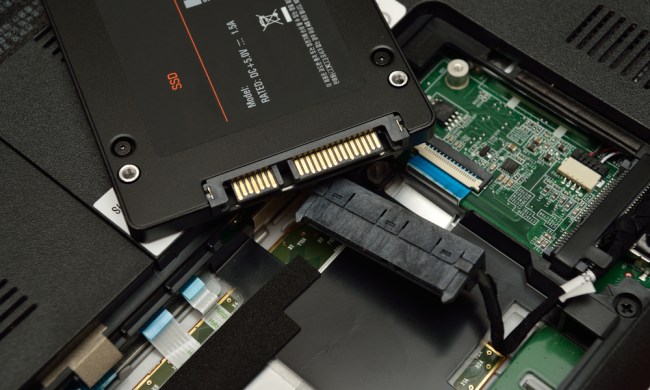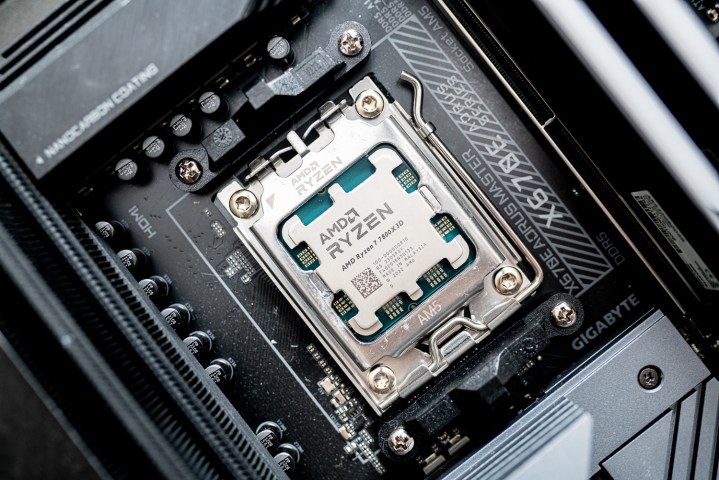
AMD and Intel have fought for supremacy for decades, duking it out in a bid to make the best processors you can buy. The competition is fierce, and that's a great thing for PC enthusiasts. In 2024, the list of the best CPUs is larger than ever and packed with options from Team Red and Team Blue.
Intel's bang-for-the-buck king of this generation is the 14600K, but its last-gen flagship the 13900K is still well worth considering. If you're a gamer though, the 7800X3D should be the top of your list. Here's a rundown of those chips and a whole lot more.










Intel Core i5-14600K
The best value processor
- Big improvements in gaming performance
- Same pricing as previous generation
- Works with LGA1700 socket
- AI-assisted overclocking on 14900K
- Minor productivity improvements
- Still slower than AMD 3D V-Cache chips
- Still very power hungry
Why you should buy this: It's one of the fastest CPUs you can buy for around $300.
Who it's for: Builders looking for the best bang for their buck.
Why we chose the Intel Core i5-14600K:
It's tough beating the Core i5-14600K on pure value. This slot was previously held by Intel's Core i5-13600K, and if you already have that processor, it's best to stick with it. If you're upgrading from anything older, though, the Core i5-14600K is the CPU to buy.
It comes with the same core count as its last-gen counterpart, though with additional optimizations and a slight bump to clock speed. The result is slightly better productivity performance and much better gaming performance. On top of that, Intel didn't raise the price of its Core i5 chip, so you're getting better performance for around the same price. You can overclock this CPU, so if you don't mind pushing the power draw and temperatures even higher, you can close that gap with the higher-end CPUs a little more.
At the time of publication, the Core i5-14600K is only around $30 more expensive than the Core i5-13600K. We recommend checking the prices of the last-gen chip, however, because it still offers most of the performance and could be a better value.


AMD Ryzen 7 7800X3D
The best gaming processor
- Chart-topping gaming performance
- Great value
- Solid multi-core and productivity performance
- AM5 is getting cheaper
- Weak single-core performance
Why you should buy this: It's easily the best gaming processor in terms of value and performance.
Who's it for: Gamers who want top-notch performance without spending more than necessary.
Why we chose the AMD Ryzen 7 7800X3D:
With the launch of the Ryzen 7 7800X3D, the 5800X3D finally has a worthy successor. This CPU is the fastest gaming CPU out there, beating Intel's Core i9-13900K by miles and even eclipsing the 14900K in most games. In pure gaming scenarios, it also keeps up with the pricier Ryzen 9 7950X3D.
The Ryzen 7 7800X3D benefits from AMD's 3D V-Cache technology, and once again, it shows off the power of adding copious amounts of L3 cache on top of the chip. It sports a total of 104MB cache, which marks a drastic upgrade from the Ryzen 7 7700X, which only comes with 40MB.
In terms of core counts, AMD seems to have stuck with what worked well for it before. The processor has eight cores and 16 threads. The boost clock speed is considerably lower than in the Ryzen 7 7700X -- the 7800X3D maxes out at 5GHz. However, it still remains far superior in gaming tasks.
This chip is insane for gaming, but it drops off a cliff in productivity tasks when you compare it to the Ryzen 9 7950X3D. However, for pure gamers, this should not be a problem. In our internal testing, the CPU hit almost the same frames per second (fps) as the more expensive part -- 239.3 versus 239.5. If you just want a solid processor for gaming, save your money and go with this one.

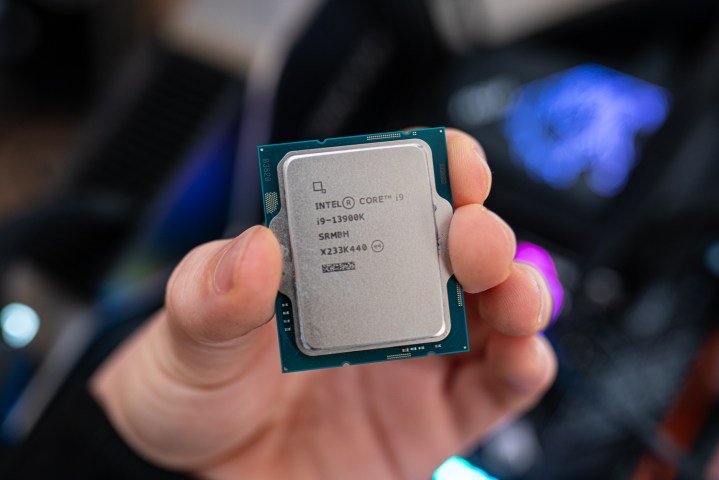
Intel Core i9-13900K
The best Intel processor
- Cheaper than AMD competition
- Support for 600-series motherboards and DDR4
- Solid multi-core improvements
- Surprising gen-on-gen improvements
- High power demands
- Small gaming performance gains
Why you should buy this: It tops performance charts in nearly every benchmark, and it's cheaper than the competition from AMD.
Who it's for: Enthusiasts who need high core counts and blistering clock speeds to accelerate video editing, compression, and other demanding tasks.
Why we chose the Intel Core i9-13900K:
Intel's 13900K might not be the flagship it once was, but it's basically the same as the 14900K, it's cheaper, and it uses less power. What's not to love?
Similar to the previous-generation's Core i9-12900K, the Core i9-13900K combines performance (P) cores and efficient (E) cores. Core counts are up this time around, though. You're getting eight P-cores designed on the new Raptor Cove microarchitecture, as well as 16 E-cores using the Gracemont architecture from the previous generation.
Those extra cores help accelerate demanding multithreaded tasks, which is why the Core i9-13900K managed an 8% lead over the Ryzen 9 7950X in Cinebench R23. The redesigned P-cores also help the Core i9-13900K outpace AMD's best by 12% in Cinebench's single-core test.
Across nearly all benchmarks, the Core i9-13900K tops the charts, aided in no small part by additional L2 cache and boosted clock speeds. It's the fastest processor you can buy, but more importantly, it comes in cheaper than AMD's Ryzen 9 7950X.
However, it can't catch up with the X3D CPUs in gaming, so you will be falling behind a little there if you opt for this powerful Intel alternative, so bear that in mind. The upgrade path is a little limited, too, as you only really have the 14th gen to move to and nothing there beyond the very top chips can compete with the 13900K.


AMD Ryzen 9 7950X
The best AMD processor
- Off the charts CPU performance
- Solid gaming improvements
- Integrated graphics work for light games
- Works with most AM4 coolers
- DDR5 could bloat cost
Why you should buy this: It's insanely fast, and it's set up to support AMD's future platforms for many years.
Who it's for: AMD fans who want the best of the best and don't mind spending a little extra.
Why we chose the AMD Ryzen 9 7950X:
While it's not quite as fast as the 13900K or 14900K in gaming or productivity, there's no denying the raw power of the Ryzen 9 7950X, which nearly matches the Core i9-13900K in most tests.
The processor delivers on its promises, offering a 31% jump in single-core performance and a 36% improvement in multi-core performance compared to the previous generation. It takes a slight back seat in some tasks compared to the Core i9-13900K, but only by razor-thin margins. And in some games, like Far Cry 6, the Ryzen 9 7950X is actually a bit faster.
Beyond the processor itself, the Ryzen 9 7950X introduces AMD's new AM5 platform. It used to be much more expensive, but thankfully, new motherboards and falling prices for even the best DDR5 RAM make the upgrade a little more affordable. In addition, AMD says it will support AM5 until at least 2025 (and maybe beyond). That means it should be easy to upgrade to future Ryzen generations without buying a new motherboard.
Although the Ryzen 9 7950X isn't at the peak of performance, it's just a step behind. And with features like Smart Access Memory and distant platform support on offer, it's still a very attractive flagship CPU.

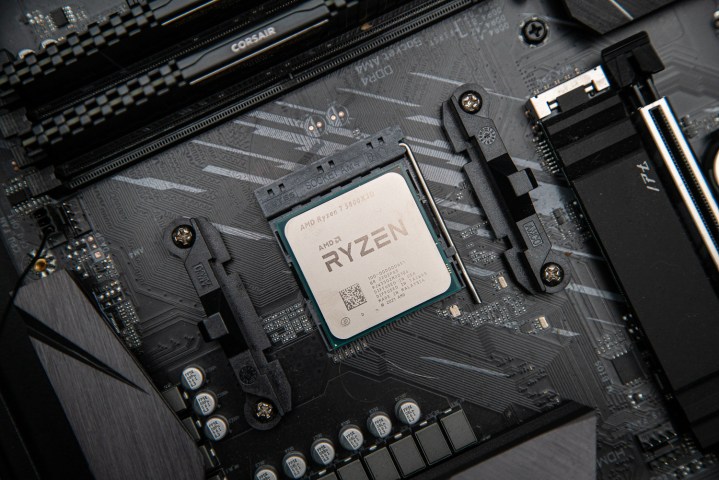
AMD Ryzen 7 5800X3D
The best last-gen processor for gaming
- The fastest gaming CPU on the market
- Solid thermal performance
- Works with AM4 motherboards
- Inexpensive
- Low power requirements
- No overclocking
- Lackluster general CPU performance
Why you should buy this: It's still a monster of a gaming CPU, even with current-gen options making the rounds.
Who it's for: Gamers who don't need a lot of CPU power for other tasks.
Why we chose the AMD Ryzen 7 5800X3D:
The Ryzen 7 5800X3D is the fastest AM4 processor for gaming ever made, and it will hold that title for the rest of time, because there are no new AM4 chips coming down the pipe which can compete. It blows everything else from the same generation out of the water and remains competitive in gaming with much newer processors. Why? A curious technology called 3D V-Cache.
For specs, the Ryzen 7 5800X3D is slightly worse than the base Ryzen 7 5800X. It comes with the same eight Zen 3 cores, but the clock speed is 200MHz slower, and you can't overclock the 3D-stacked part. The difference is that the Ryzen 7 5800X3D comes with an additional 64MB of L3 cache stacked on top of the processor.
It doesn't sound like a big deal, but extra L3 cache makes a big difference in games. The Ryzen 7 5800X3D beats everything while gaming, including the Core i9-12900KS that costs twice as much. It's also still competitive against newer CPUs from both Intel and AMD.
The Ryzen 7 5800X3D is one of the best gaming CPUs, and it only really takes a backseat to AMD's 3D V-Cache newcomers, the Ryzen 9 7950X3D and the Ryzen 7 7800X3D. Keep in mind that this is a pure gaming CPU. If you plan on doing intense video encoding or other productivity tasks, it's better to go with an AMD or Intel chip with a higher core count.


Intel Core i3-12100
The best processor under $100
- Sells for under $100
- Four performance cores
- Includes a CPU cooler
- No integrated graphics
Why you should buy this: It's still a competent quad-core processor that's very inexpensive.
Who it's for: PC builders on a tight budget who want a solid processor for gaming and work without overspending.
Why we chose the Intel Core i3-12100F:
It's tough finding CPUs under $100 in 2024, but the Core i3-12100F is a standout. It's part of the Alder Lake family, and though it does have newer-generation counterparts in the 13100 and 14100, they are more expensive and don't perform much better, making the 12100F an absolute steal for a budget gaming PC.
The Core i3-12100F is a quad-core CPU that ranks among the best Intel processors you can buy. It doesn't come with a hybrid architecture, instead opting for four performance cores, but that doesn't hurt performance too much. It lacks onboard graphics, too, so you will need a dedicated graphics card with it.
Gaming is certainly possible, even if it's a bit behind the six-core Ryzen 5 5600X, and day-to-day use is excellent. This is an entry-level processor, no doubt, but the Core i3-12100F still punches above what its price would suggest.

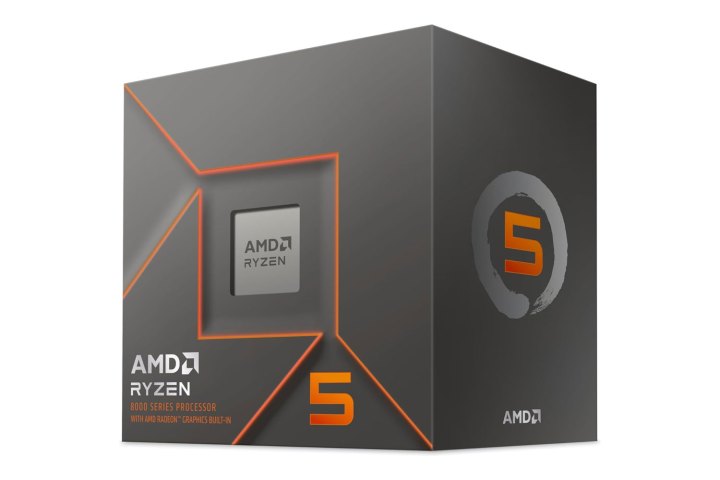
AMD Ryzen 5 8500G
The best processor with integrated graphics
- Excellent integrated graphics
- Includes a CPU cooler
- Low power draw
- iGPU isn't powerful enough for AAA gaming
Why you should buy this: It's one of the few good APUs that you can buy right now, and it's relatively cheap.
Who it's for: PC builders on a tight budget who want a solid processor for gaming and work without overspending.
Why we chose the AMD Ryzen 5 8500G:
Gaming without a GPU is possible, but it's not an ideal experience. The AMD Ryzen 5 8500G is an exception, because its onboard RDNA 3 GPU is more than capable of playing most games at 1080p medium settings at 30 frames per second (fps) in AAA games, and a far higher rate in more casual titles. It's not going to replace a dedicated graphics chip, and the CPU isn't as fast as its non-APU counterparts, but it's a great choice for GPU-free gaming.
It has six Zen4+ cores, giving it solid CPU performance, with support for 12 threads. It is limited to a 5GHz boost clock, though, which is lower than its Ryzen 7000 counterparts. Still, it has a low TDP, and if you're building a budget gaming machine, want to save money to buy a bigger graphics card later, or are putting together a compact machine that will only do light gaming, the 8500G is a great pick.
If you want more power, the 8700G is available, but it's around twice the price and its performance isn't that much better.


AMD Ryzen 5 7600
The best value AMD processor
- Suitable for gaming and productivity
- Excellent value
- High maximum clock speed
- Still just six cores
- No access to DDR4
Why you should buy this: It's a well-rounded CPU that doesn't cost an arm and a leg.
Who's it for: Gamers and other users in search of a good deal.
Why we picked the AMD Ryzen 5 7600:
AMD made sure that the apple doesn't fall far from the tree with the Ryzen 5 7600. It's close to its predecessor in some ways, sporting the exact same core count, but it does offer a number of generational upgrades that make it a good way to future-proof your PC.
The Ryzen 5 7600 comes with six cores and 12 threads. It has a maximum clock speed of 5.2GHz. It's a pretty well-rounded processor, with solid gaming performance, but also plenty of room for productivity. It's not going to beat some of this generation's heavyweights, but it's more than sufficient even for AAA gaming purposes.
The downside of it lies in the extra expense compared to the last-gen chip, and it's all due to AMD's new AM5 platform. This means a new motherboard if you're upgrading, and unfortunately, you have to stick with DDR5 memory due to a lack of DDR4 support.
This is why the previous-gen chip is still a very attractive choice — overall, you're looking at quite big savings if you stick to the previous generation. On the other hand, switching to AM5 now means plenty of room for upgrades going forward.

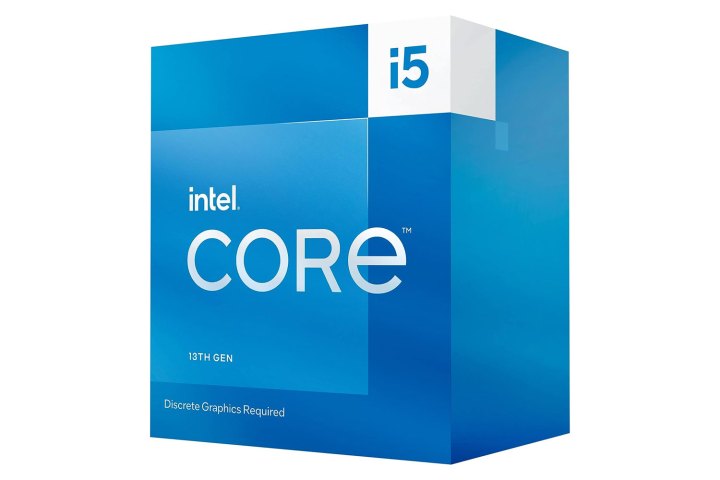
Intel Core i5-13400F
Best value Intel CPU
- Fast performance in gaming
- Efficiency cores help it punch above its weight in productivity
- Much more energy efficient than higher-end models
- Works with DDR4 and DDR5
- Cheaper than newer models
- Limited upgrade path
- Not as fast as the 14th gen equivalent
Why you should buy this: It's a CPU that punches above its weight at an affordable price tag.
Who's it for: Gamers and other users in search of a good deal.
Why we picked the Intel Core i5-13400F:
The Intel Core i5-13400F might be a last-generation chip, and it might be a little slower than the new-gen 14400, but there's a sizeable discount to be had for opting for this slightly older model. It works on the same motherboards, supports the same DDR4 or DDR5 memory, and it has the same (albeit limited) upgrade potential.
It's the cheapest Intel 13th- or 14th-generation CPU with efficiency cores, so its productivity performance is seriously impressive, rivaling much more high-end CPUs from older generations and offering credible competition for higher-end AMD CPUs. Pair it with a midrange graphics card, and this is a seriously capable chip for gaming.
As for upgrades, you'll only be able to switch it out for higher-end 13th and 14th gen chips, which does give you an upgrade path, but that's the end of it. After this generation, you'll need to switch out the motherboard for something new.

Frequently Asked Questions
The fastest processor you can buy right now is the Intel Core i9-14900K. It comes with 24 cores and high clock speeds, allowing it to rip through games and intense productivity applications. However, it has serious competition in gaming from the AMD 7800X3D and 7950X3D, both of which are far more efficient and draw far less power than the 14900K. They can't compete on productivity, but the AMD Ryzen 9 7950X, isn't far behind and is no slouch in gaming either.
Intel Core i7 and Core i5 processors are both excellent options. As the names suggest, i7 processors are faster and more powerful than i5 processors, and they're more expensive. They may not be the best choice for everyone, though.
For several generations, Intel has segmented six cores to its Core i5 processors and eight cores to its Core i7 processors. The two extra cores provide a performance boost, but they're not as important if you're gaming or running basic applications on your PC.
AMD and Intel are the main CPU manufacturers, and they tend to leapfrog each other every couple of years. Currently, Intel processors are the best option for raw performance all round, but that comes at a high power draw. For absolute gaming performance, though, AMD's X3D CPUs, like the 7800X3D and 7950X3D as the fastest out there.
See our CPU buying guide to help you make the right choice.
In short, yes. The more high-performance RAM you have (currently, you should be looking at DDR5), the better your CPU will seem. If you understand what RAM is and how it works with the CPU, you should be able to configure a system that works perfectly.





